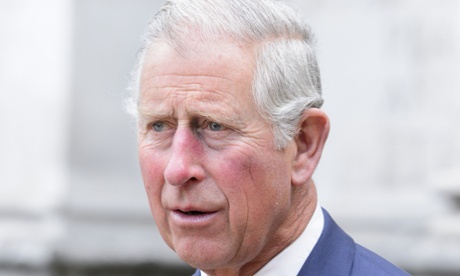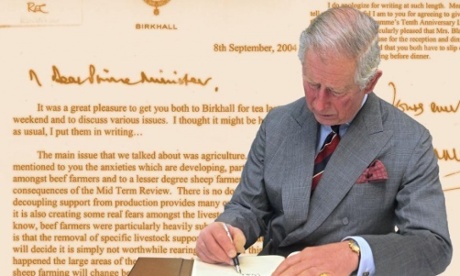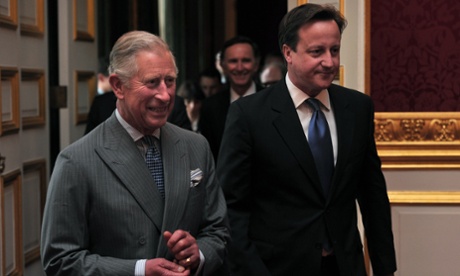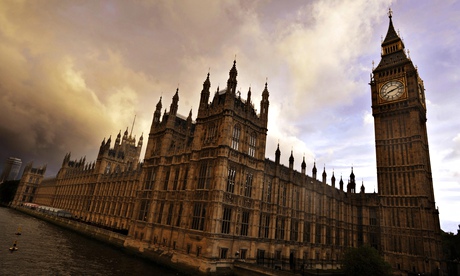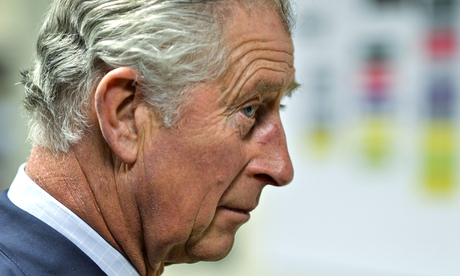A cache of secret memos between Prince Charles and senior government ministers has been released after a 10-year legal battle, offering the clearest picture yet of the breadth and depth of the heir to the throne’s lobbying at the highest level of politics.
The 27 memos, sent in 2004 and 2005 and released only after the Guardian won its long freedom of information fight with the government, show the Prince of Wales making direct and persistent policy demands to the then prime minister Tony Blair and several key figures in his Labour government.
From Blair, Charles demanded everything from urgent action to improve equipment for troops fighting in Iraq to the availability of alternative herbal medicines in the UK, a pet cause of the prince.
In a single letter in February 2005, he urged a badger cull to prevent the spread of bovine tuberculosis – damning its opponents as “intellectually dishonest”; lobbied for his preferred person to be appointed to crack down on the mistreatment of farmers by supermarkets; proposed his own aide to brief Downing Street on the design of new hospitals; and urged Blair to tackle a European Union directive limiting the use of herbal alternative medicines use in the UK.
The government has spent more than £400,000 on legal costs in its ultimately failed attempt to block the original 2005 freedom of information request by the Guardian journalist Rob Evans. The case was eventually decided at the supreme court and the decade-long saga involved in total 16 different judges.
David Cameron’s last government attempted to veto the release. In 2012 the then attorney general, Dominic Grieve, warned they “would be seriously damaging to his role as future monarch because, if he forfeits his position of political neutrality as heir to the throne, he cannot easily recover it when he is king”.
But following the release of the “black spider” memos – so-called because of the prince’s scrawled handwriting – there were questions on Wednesday about whether it was worth the money to try to keep secret details of his lobbying, some of which reflects Charles’s very narrow personal interests.
For example, in October 2004 he told the environment minister Elliot Morley he hoped “illegal fishing of the Patagonian toothfish will be high up on your list of priorities because until that trade is stopped, there is little hope for the poor old albatross”.
But they also cover more controversial subjects. In one memo, Charles explicitly lobbied Tony Blair when he was prime minister to replace Lynx military helicopters.
Charles complained that delays in their replacement was “one more example where our Armed forces are being asked to do an extremely challenging job (particularly in Iraq) without the necessary resources”. Blair responded that replacement would be a priority for spending.
He directly urged the health secretary, John Reid, to accelerate redevelopment at a hospital site in Sunderland in which his own architecture charity was involved, warning bluntly that “chickens will come home to roost” in Reid’s government department if action was not taken.
The letters revealed not only that ministers often responded actively to his suggestions but they appeared to hold his interventions in high regard.
Blair replied to him in one letter: “I always value and look forward to your views – but perhaps particularly on agricultural topics.”
After Charles Clarke, then education secretary, responded to Charles’ complaint about the nutritional content of school meals, he signed off: “I have the honour to be, Sir, Your Royal Highness’s most humble and obedient servant.”
The memos also reveal how dogged Charles can be in demanding actions from ministers as it emerged that his engagement with key political players has not abated. Since the beginning of 2010, the prince held 87 meetings with ministers, opposition party leaders and top government officials, new figures release by the campaign group Republic showed. This year he has held meetings with, among others, David Cameron, the Scottish National party leader, Nicola Sturgeon, the education secretary, Nicky Morgan, and Alistair Carmichael, then Scotland secretary.
The letters emerged amid growing signs that Prince Charles is planning to rule in a far more outspoken way than the taciturn Queen. Allies told the Guardian last year he planned “heartfelt interventions” in national life, while in 2013 his friend and biographer Jonathan Dimbleby said: “A quiet constitutional revolution is afoot.”
But this is likely to be the only glimpse the British public gets of Charles’ correspondence with ministers. Since the original Guardian request to see the letters the government has tightened up the Freedom of Information Act to provide an “absolute exemption” on all requests relating to the Queen and the heir to the throne.
Paul Flynn, a Labour MP and member of the political and constitutional reform committee, said the letters lifted the lid on the activity of the “the lobbyist supreme in the land”.
“They show he is putting forward a whole variety of views – including many bad science views and others that should have no more weight than the man down the pub,” he said. “We can see his views were given a seriousness and priority they did not deserve.”
Prince Charles was said to be “disappointed” the principle of confidentiality had not been maintained, and his spokeswoman said publication “can only inhibit his ability to express the concerns and suggestions which have been put to him in the course of his travels and meetings”.
But aides argue the letters do not show the prince engaging in matters of party political contention, implying they do not breach the principle of political neutrality.
“The letters published by the government show the Prince of Wales expressing concern about issues that he has raised in public,” his spokeswoman said. “In all these cases, the Prince of Wales is raising issues of public concern, and trying to find practical ways to address the issues.”
But the Guardian’s editor-in-chief, Alan Rusbridger, said: “We fought this case because we believed – and the most senior judges in the country agreed – that the royal family should operate to the same degrees of transparency as anyone else trying to make their influence felt in public life. The attorney general, in trying to block the letters, said their contents could ‘seriously damage’ perceptions of the prince’s political neutrality.
“Whatever the rights and wrongs of that assessment, it is shocking that the government wasted hundreds of thousands of pounds of public money trying to prevent their publication. Now, after 10 years, we are pleased to be able to share the contents of his correspondence and let people draw their own conclusions.”
Graham Smith, chief executive of Republic, which campaigns for an elected head of state, said: “These letters are only a small indication of widespread lobbying that’s been going on for years. We now need full disclosure and an assessment of his impact on government policy.”
Maurice Frankel, director of the UK Campaign for Freedom of Information, said: “The release of the Charles memos represents a major victory for the freedom of information process, showing that ministers cannot block disclosure simply because they don’t like the result.”
Michael Meacher, a former Labour environment secretary who received private letters from Charles about policy, called for a new system of transparency around his correspondence with ministers when he becomes king to “remove public suspicion from the process”.
“A brief statement would be made when the king has written to a minister and the subject would be obvious,” he said. “At least we would know he has been giving his opinions and, some would say, lobbying ministers.”





